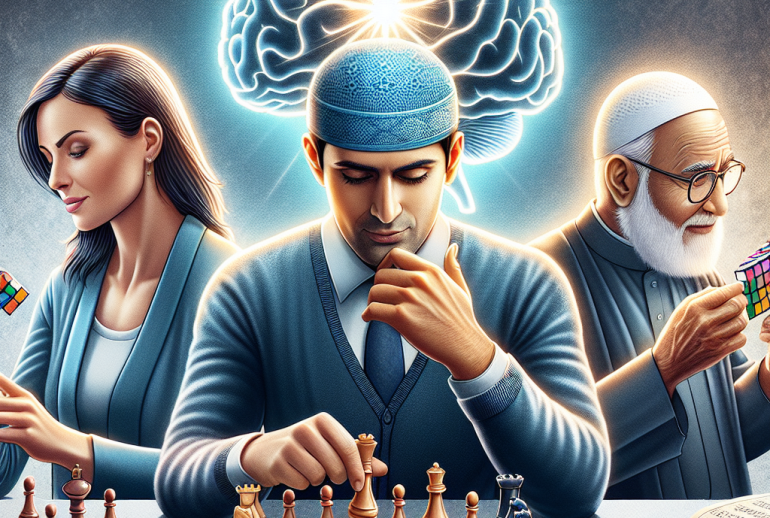Brain Games to Keep Your Mind Sharp
In a world that constantly demands high levels of mental acuity and efficiency, taking steps to maintain cognitive health is more important than ever. Brain games offer a fun and effective way to keep your mind sharp, improve cognitive function, and stave off mental decline.
This detailed exploration will dive into the fascinating realm of brain games, examining their benefits, various types, and how they can be effectively integrated into your daily routine.
The Benefits of Brain Games
Brain games have been studied extensively, and research consistently supports their cognitive benefits. Below are some of the primary advantages:
1. Improved Memory
Memory is a critical cognitive function, and many brain games are specifically designed to enhance it. Games like Sudoku, crosswords, and memory-matching exercises challenge your recall abilities and force the brain to work harder, thus strengthening memory.
2. Enhanced Problem-Solving Skills
Games like chess, puzzles, and strategy-based video games require logical thinking, planning, and problem-solving, all of which are vital cognitive skills. These games enhance your ability to process information and make decisions quickly and efficiently.
3. Increased Attention and Concentration
Maintaining focus is crucial in many aspects of life, from professional tasks to personal activities. Brain games that require sustained attention can help improve your ability to concentrate and stay on task for longer periods.
4. Boosted Mental Agility
Mental agility refers to the brain’s ability to switch between tasks efficiently and adapt to new situations. Games that require quick thinking and adaptability, such as time-based challenges and fast-paced video games, can help boost this mental flexibility.
5. Reduced Risk of Cognitive Decline
Engaging in brain games can help maintain cognitive function and reduce the risk of age-related cognitive decline. Some studies suggest that regular mental stimulation can delay the onset of dementia and other cognitive disorders.
Types of Brain Games
There is a wide variety of brain games available, each targeting different aspects of cognitive function. Below are some popular types and examples of each:
Puzzle Games
Puzzle games are excellent for improving problem-solving skills, logical thinking, and spatial reasoning. Examples include:
- Sudoku: This number-placement puzzle requires logical thinking and pattern recognition.
- Crosswords: Solving crossword puzzles can enhance vocabulary, memory, and lateral thinking.
- Jigsaw Puzzles: These improve spatial awareness and visual perception skills.
Memory Games
Memory games are designed to challenge your recall and retention abilities. Some popular options are:
- Memory Matching Games: These involve matching pairs of cards with the same images, which helps improve visual memory and attention.
- Simon Says: This electronic game requires players to remember and replicate a sequence of colors and sounds, enhancing auditory and visual memory.
- Concentration Cards: Similar to memory matching but using a standard deck of cards, this game helps boost short-term memory.
Strategy Games
Strategy games are excellent for honing problem-solving skills, planning, and mental agility. Examples are:
- Chess: This classic strategy game requires foresight, planning, and tactical thinking.
- Go: An ancient board game that involves complex strategy and abstract thinking.
- Strategy-Based Video Games: Games like “Starcraft” or “Civilization” require players to manage resources, plan long-term strategies, and adapt to changing scenarios.
Brain Training Apps
With the rise of technology, numerous brain training apps have been developed to help keep your mind sharp. Popular examples include:
- Lumosity: A widely used app offering a variety of games designed to improve cognitive functions like memory, attention, and problem-solving.
- Peak: This app provides games and training sessions that target different cognitive skills.
- Elevate: Focused on skills like math, reading, and writing, Elevate offers games designed to enhance cognitive abilities through real-world tasks.
How to Integrate Brain Games Into Your Routine
Incorporating brain games into your daily life doesn’t have to be a daunting task. Here are some tips to help you get started:
Set a Schedule
Consistency is key to deriving benefits from brain games. Set aside a specific time each day to play, whether it’s during a lunch break, before bed, or in the morning. Aiming for 15-20 minutes daily can make a significant difference.
Mix It Up
Variety is important to ensure that you’re challenging different areas of your brain. Rotate between different types of games to keep things interesting and to engage multiple cognitive functions.
Use Technology Wisely
There are countless apps and websites that offer brain games, making it easier than ever to find and play them. Utilize these resources to access a wide variety of games and track your progress over time.
Incorporate Social Interaction
Many brain games can be played with others, adding a social element that can further enhance cognitive benefits. Play games like chess or bridge with friends or family, or join online communities to engage in multiplayer brain games.
Challenge Yourself
As you get better at a particular game, increase the difficulty level to continue challenging your brain. This ensures that you’re constantly pushing your cognitive limits and reaping the most benefits.
Conclusion
Brain games are an enjoyable and effective way to maintain cognitive health and enhance various mental skills. With the wide variety of options available – from classic puzzles and memory games to modern brain training apps – there’s something for everyone. By making brain games a regular part of your routine, you can keep your mind sharp, improve cognitive function, and enjoy the process of mental growth.

